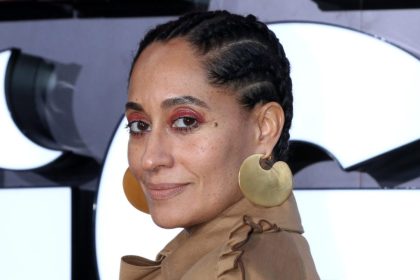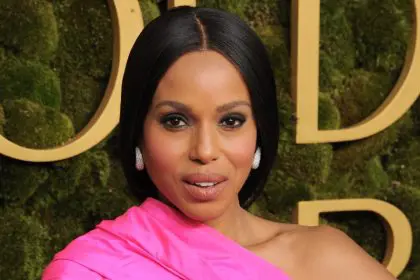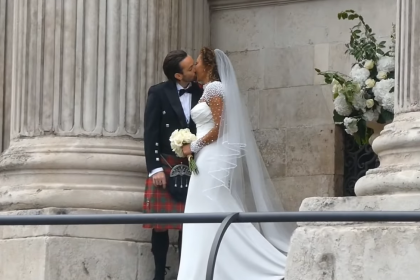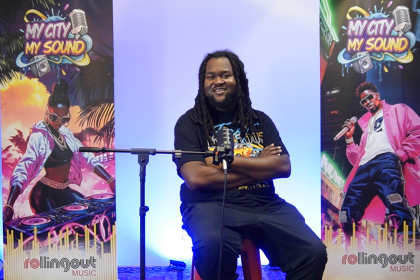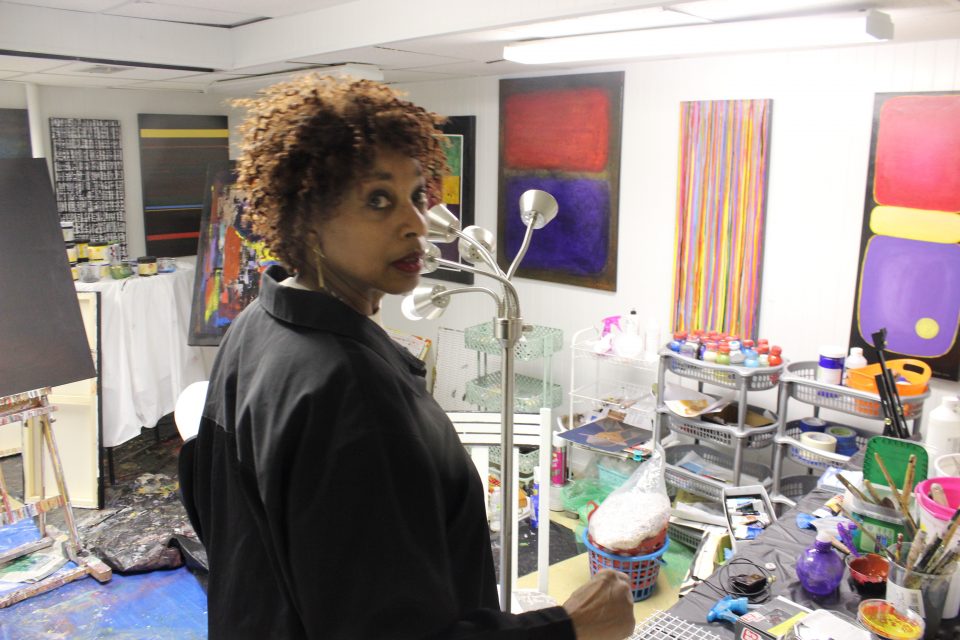
Photo provided by Priscilla Phifer
Priscilla Phifer is a professional painter who is all about inclusion for Black artists. Phifer is an intuitive artist and defines her art as abstract, which offers her more freedom and flexibility in her work.
She has been painting professionally for three years now. Her first show was a pop-up art exhibition at the Julian C. Madison Building in downtown Detroit. Most of her paintings sold very quickly, which prompted her second show in Detroit at MASH in June 2016, which was another unexpected success.
Phifer paints primarily without a brush, she tends to use methods such as splash, scrape, drip and drag using high-quality acrylic paint. Phifer is color blind but what makes her an outstanding painter is that she relies mostly on gravity and manipulation of the canvas’ surface.
Phifer is affiliated with many organizations, including the National Conference of Artists, Farmington Art Foundation, Detroit Fine Arts Breakfast Club, the Pierians Inc., Charles Wright Museum of African American History, The Community House, and Birmingham Bloomfield Art Center. Phifer also holds a bachelor’s degree in interdisciplinary studies from Wayne State University, Detroit.
Here, Phifer discusses the importance of collaborating with other artists, leadership in the art world, and personal and professional successes. Read the story below for more details.
As a Black woman, what do you consider your superpower to be?
As an avid reader of newspapers, periodicals and books and being involved in various groups, there is a wealth of information and opportunities that I come across that I like to share to help others have more fulfilling lives. I don’t believe in hoarding information or keeping things a secret that could benefit others.
What key skill sets or qualities make you unique as an African American female leader?
[My] friends say that I have the ability to bring people of different cultures together and to influence them to do projects or to experience new things that they would not ordinarily do. A recent example in the art world was inviting heads of art organizations to our home to discuss the importance of art in our lives. I invited leadership from three predominantly African American organizations: The Detroit Fine Arts Breakfast Club, The Pierians, Inc., and National Conference of Artists; and Jewish-owned Paramour Fine Arts; major African American art collectors; fellow artists; and non-artists to engage in a roundtable discussion.
What thoughtful or encouraging piece of advice would you give to your younger self?
The advice to my younger self would be to stay focused on my interior “Yes” and less focused on my exterior “No.” It’s important to have the right support in achieving goals and objectives. I would tell my younger self to get a mentor! [A mentor] could have helped me out educationally and career-wise.
Why is it important for women of color to lead or work in leadership roles and decision-making capacities?
[Women] know, for example, when to use empathy, humor and negotiation to achieve desired results. Women in leadership roles can best identify issues, problem-solving, opportunities and threats to other women who want to climb the ladder. Women leaders are the voices of those in less influential roles in the workplace. [A woman’s] presence oftentimes offers a different perspective than their male counterparts that benefits both male and female employees.
Why is it important for seasoned and experienced Black women to reach back and help younger women of color?
Seasoned women can help younger women avoid the pitfalls that can prevent or derail their career; can help them in their personal and professional development, thus helping them to gain the confidence and courage they will need when education without experience is inadequate. We can impart our knowledge and mistakes made [and] they will have learned from the experienced their stories and strategies about survival in many areas of their lives and how they might approach [and] overcome them.
How do you feel about the hashtag #CollaborationOverCompetition? What qualities or values do you deem indispensable in your business partners or collaborators?
The business side of being an artist includes collaboration at times and competition at times and both are good. When there is a “call for artists,” this means that hundreds to thousands of artists are vying for a limited number of slots, and we know that going in. This is about competition. On the other hand, collaboration is necessary or wanted when accommodating a public art program, such as painting large walls or helping a business fill its space with original art. Case in point, a business owner approached me about wanting only my art in her business. I had to be honest with her about the importance of collaborating with other artists and curators to fill the massive wall space, that I would coordinate with organizations on the project. It is our job to educate and support each other and other organizations.
What are your thoughts on taking risks? Making mistakes?
As a seasoned 73-year-old with only three years of being a professional artist, I feel [more] free to make mistakes and to be my own judge on how to fix, learn or change the mistake into a positive outcome. If you can afford to take a risk, I say go for it. It could be the best risk you will ever take. Even if it turns out not the way you had hoped [for], then consider it a lesson learned.
As a successful woman in business, what is your greatest or proudest achievement?
In addition to overcoming the fear of failure, my greatest achievement has been the three successful solo art shows I have had which have become community events, thus having many collectors and organizations where my work can be found. I am also proud that my art has been juried in for auctions on numerous occasions to enable nonprofit organizations to help raise dollars for their community programs.




